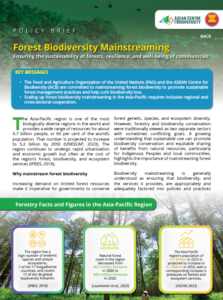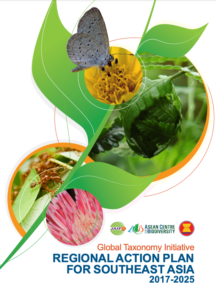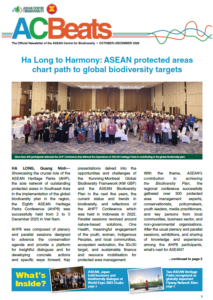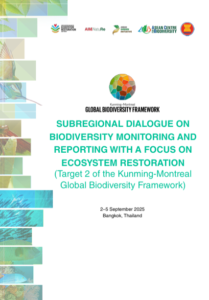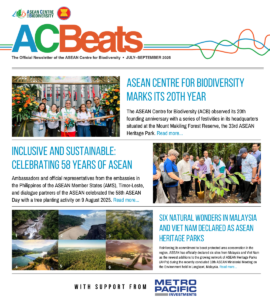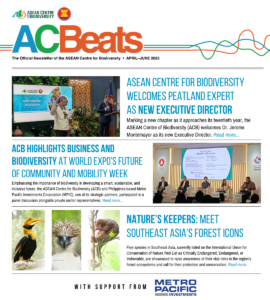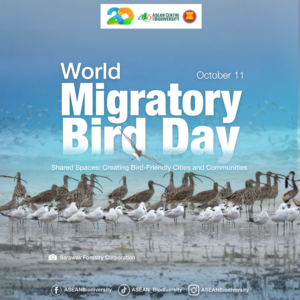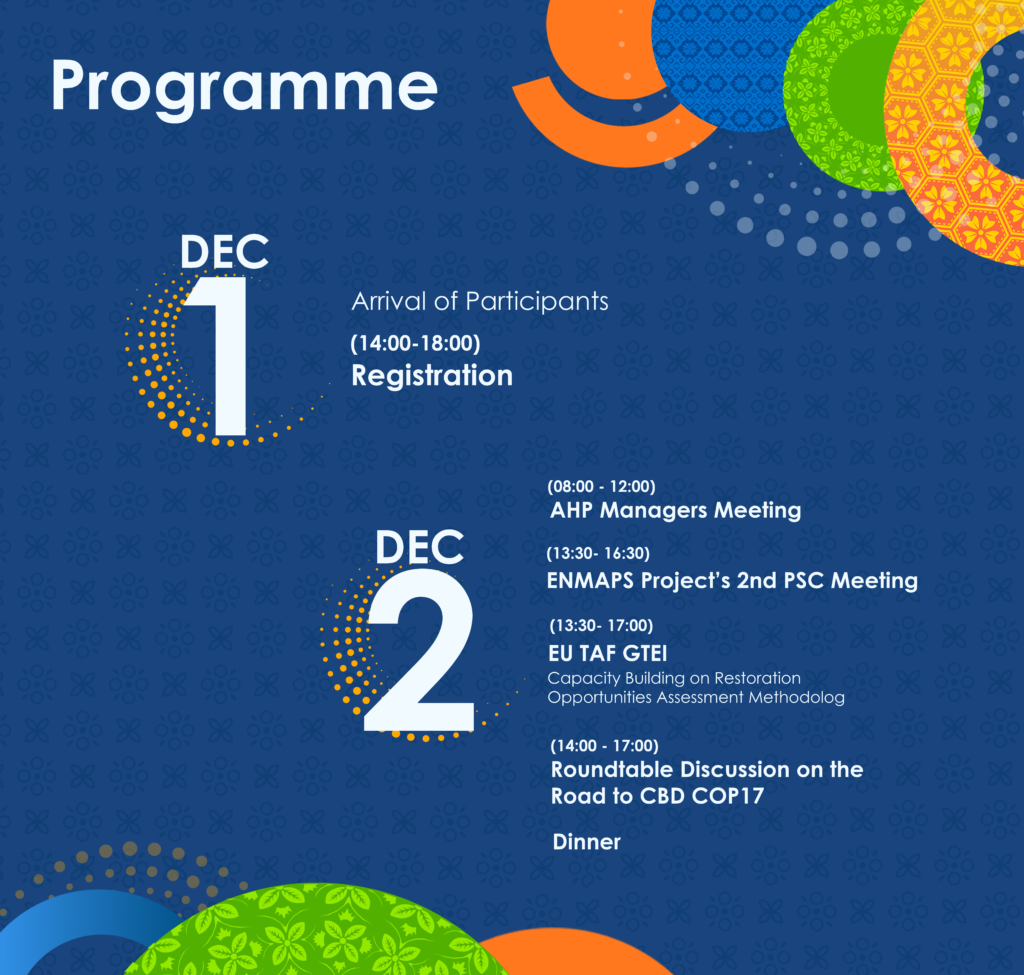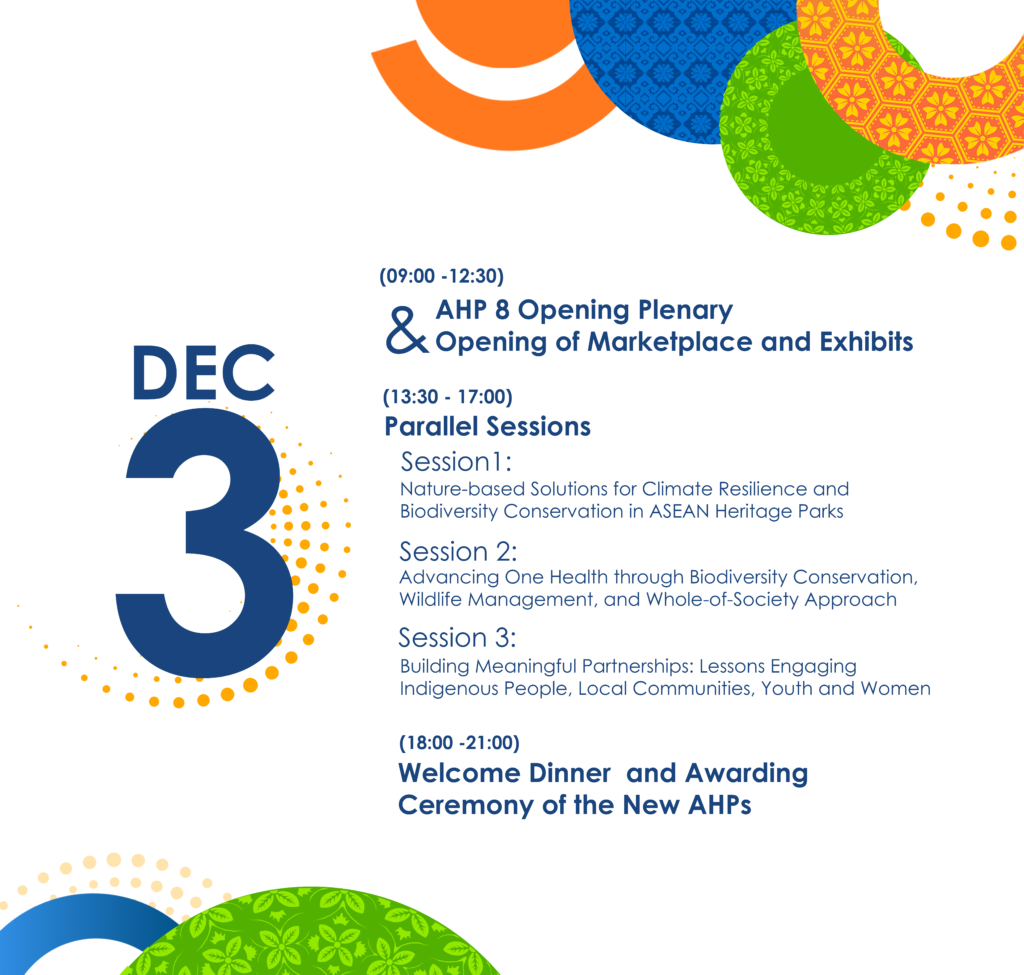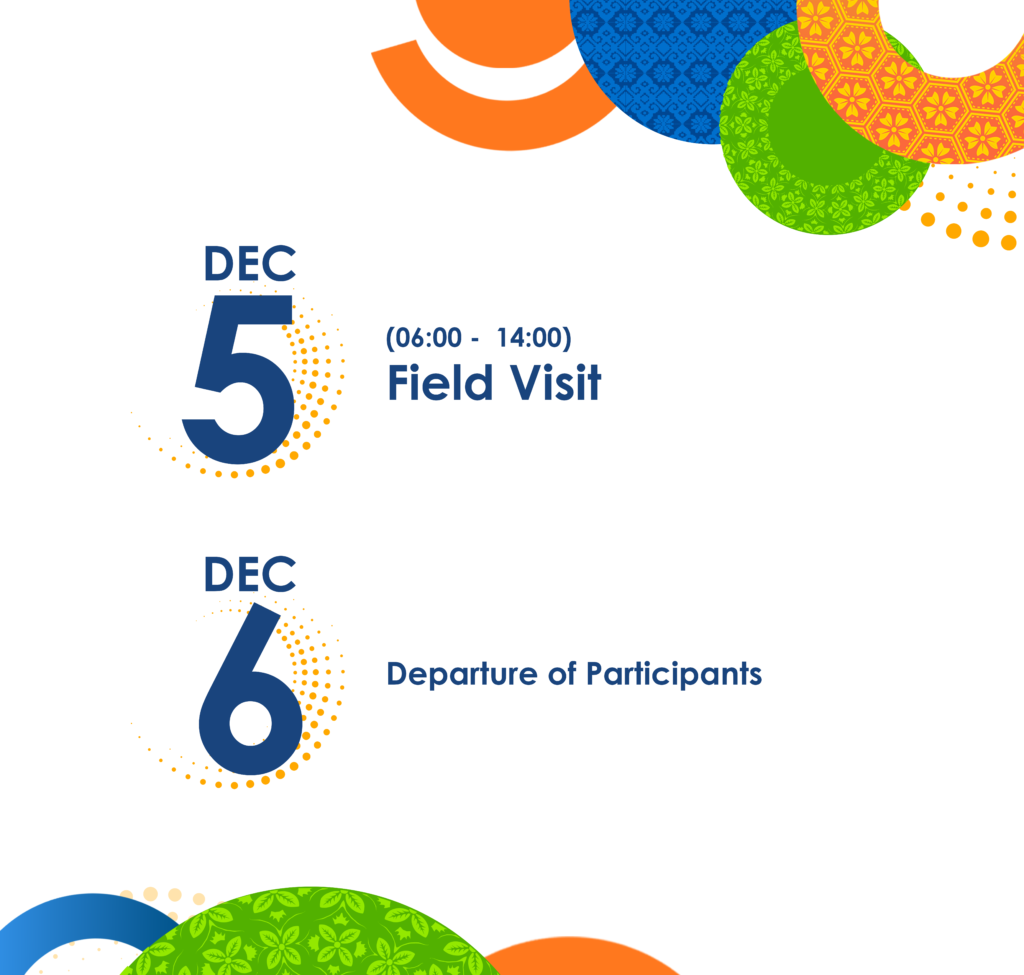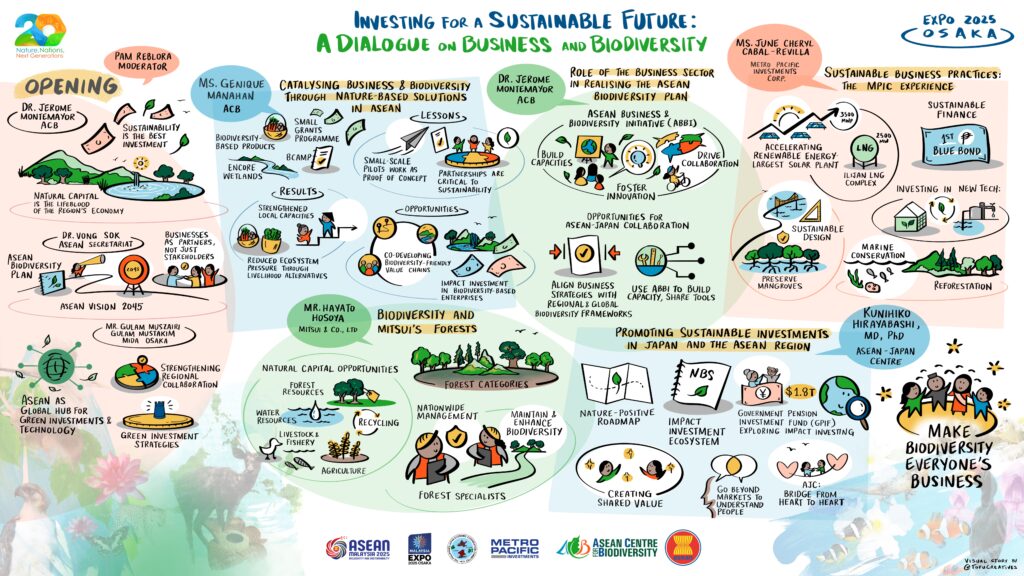
Visual summary of the Investing for a Sustainable Future: A dialogue on business and biodiversity.
OSAKA, Japan — Recognising the growing importance of mainstreaming biodiversity conservation in the business sector, the ASEAN Centre for Biodiversity (ACB), in partnership with the Metro Pacific Investments Corporation (MPIC), Malaysia Pavilion, and the ASEAN Secretariat, organised Investing for a Sustainable Future: A Dialogue on Business and Biodiversity on 8 October 2025, at the World Expo in Osaka, Japan.
The forum gathered representatives from the business sector at the Malaysia Pavilion to discuss how biodiversity conservation is both a viable and necessary investment. It was also a platform to discuss the ACB’s current initiatives and how the business sector can contribute to the achievement of the Kunming-Montreal Global Biodiversity Framework, the pathway to the global vision of living in harmony with nature by 2050.
ACB Executive Director Jerome Montemayor discussed how the ASEAN region’s rich biodiversity, which serves as the lifeblood of economies and livelihoods, is threatened due to deforestation, climate change, unsustainable practices, and other effects of human activities. “According to the ASEAN Natural Capital Status Report, 30 per cent of the region’s wealth is derived from nature—a resource base valued at tens of trillions of dollars annually,” Montemayor said. “Inasmuch as the region prides itself on being home to some of the world’s most diverse countries, Southeast Asia is also facing a severe and accelerating biodiversity and climate crisis, and we are now called the epicentre of species extinction,” he added.

(L-R) Dr. Jerome L. Montemayor, ACB Executive Director; Dr. Vong Sok, Head, Environment Division, ASEAN Secretariat; and Mr. Gulam Muszairi Gulam Mustakim, Director of the Malaysia Investment Development Authority in Osaka
Research indicates that the ASEAN region could lose up to 42 per cent of its wildlife species by the end of the century. The region also has the highest rate of mangrove loss in the world, and an estimated 40 per cent of coral reefs have already been lost. Between 2001 and 2019, about 610,000 square kilometres of forests have disappeared. “This has a profound impact on the lives of people who directly rely on these natural resources for their food, water, and economic survival. If no concrete action is taken, this projection could mean loss of the very thing that supports life,” Montemayor added.
Mandated to amplify the call for regional cooperation and international collaboration to advance conservation efforts, the ACB is working to integrate biodiversity into key development sectors, including business, to promote nature-positive economic progress. In 2023, the ACB and the ASEAN Business Advisory Council (ABAC) established the ASEAN Business and Biodiversity Initiative (ABBI), an informal regional platform for the exchange of knowledge and information, with the objective of fostering business and biodiversity collaboration in the ASEAN region.
Dr. Vong Sok, Head of the Environment Division and Assistant Director of the Sustainable Development Directorate, ASEAN Socio-Cultural Community Department of the ASEAN Secretariat, explained how the ASEAN Biodiversity Plan, a comprehensive framework for shared action, acknowledges that safeguarding our natural capital is not only an environmental necessity but also a key economic strategy. He also added that the “business community is not just a stakeholder in biodiversity conservation but an essential partner and catalyst for transformative change. We are witnessing an encouraging evolution in corporate thinking, where sustainability is increasingly recognised as a driver of innovation, resilience, and long-term profitability.”
Additionally, Mr. Gulam Muszairi Gulam Mustakim, Director of the Malaysia Investment Development Authority in Osaka, welcomed the participants on behalf of Malaysia’s Ministry of Investment, Trade, and Industry. He highlighted Malaysia’s current initiatives that align with inclusivity and sustainability, the theme of Malaysia’s 2025 ASEAN Chairmanship. He said, “We are not just representatives of a nation but are stewards of a mandate that carries the hope of our people. We invite you to join us in investing in a future that is green, inclusive, and resilient.”

Metro Pacific Investments Corporation Executive Director and Chief Finance, Risk, and Sustainability Officer June Cheryl Cabal-Revilla joined Mitsui & Co., Ltd. Executive Director Hayato Hosoya and ASEAN-Japan Centre Secretary-General Kunihiko Hirabayashi in an open forum, sharing their experiences in integrating biodiversity in their business strategies.
Mainstreaming biodiversity in the business sector: The ASEAN way
ACB Programme Officer for Project Development Genique Manahan discussed catalysing business and biodiversity through nature-based solutions. She highlighted some of the regional efforts in integrating biodiversity in the plans and processes of the private sector such as the establishment of the ABBI with the ABAC; striking the balance between conservation and livelihood improvement through the Small Grants Programme by the ACB with KfW Development Bank; the implementation of a project with Germany on the promotion of biodiversity-based products as an economic source of livelihood improvement in ASEAN; and the development of business and financial plans for ASEAN Heritage Parks under the Biodiversity Conservation and Management of Protected Areas in ASEAN (BCAMP) with the European Union, and the Enhancing Conservation and Restoration of Wetlands and Peatlands in ASEAN as Effective Sinks and Reservoirs of Greenhouse Gases (EnCORE Wetlands) Project supported by the ASEAN-UK Green Transition Fund.
Dr. Montemayor presented how the business sector can be a part of realising the ASEAN Biodiversity Plan (ABP) in three steps: leverage Japan’s leadership in environmental, social, and governance, innovation, and biodiversity finance to support ASEAN’s biodiversity goals; align business strategies with regional frameworks such as the ABP and Kunming-Montreal Global Biodiversity Framework; and use the ABBI platform to convene dialogues, share tools, and build capacity across sectors.

Another highlight of the forum is a tour around the Malaysia Pavilion and the Maritime Heritage at the ASEAN Heritage Parks Exhibition of the ASEAN Secretariat.
Sustainable business practices: Philippines and Japan
From the business sector perspective, MPIC Executive Director and Chief Finance, Risk, and Sustainability Officer June Cheryl Cabal-Revilla shared their experiences in adopting sustainable business practices specifically in: accelerating renewable and low-carbon energy expansion; sustainable design and environmental and social disruption mitigation; pioneering environmental financing and alternative water resources; investing in new technologies; forging partnerships in climate action and biodiversity conservation; and protecting nature through collaboration and technology.
Moreover, Mitsui & Co., Ltd. Deputy General Manager Hayato Hosoya shared how they are using nature-based solutions for a decarbonised society through Mitsui’s Forests. They are striving to cultivate sustainable forests and aiming to realise a virtuous cycle in which the diverse functions of forests are properly protected and nurtured, the natural capital and functions of forests are utilised in a multifaceted manner, and the diverse value that forests bring is returned to society while at the same time profits are returned to forest cultivation.
Meanwhile, ASEAN-Japan Centre (AJC) Secretary-General Kunihiko Hirabayashi highlighted the need to connect nature-based solutions with impact investment. He furthered that the AJC bridges ASEAN and Japan across generations, sectors, and ideas by serving as a regional accelerator, connector, curator of best practices (particularly in sustainable tourism and youth-led development), and communicator.
The forum was held at the Malaysia Pavilion inside World Expo 2025 in Osaka, Japan. It was moderated by Pamela Quintos-Reblora, Communication Department Director of the ACB. -END-


